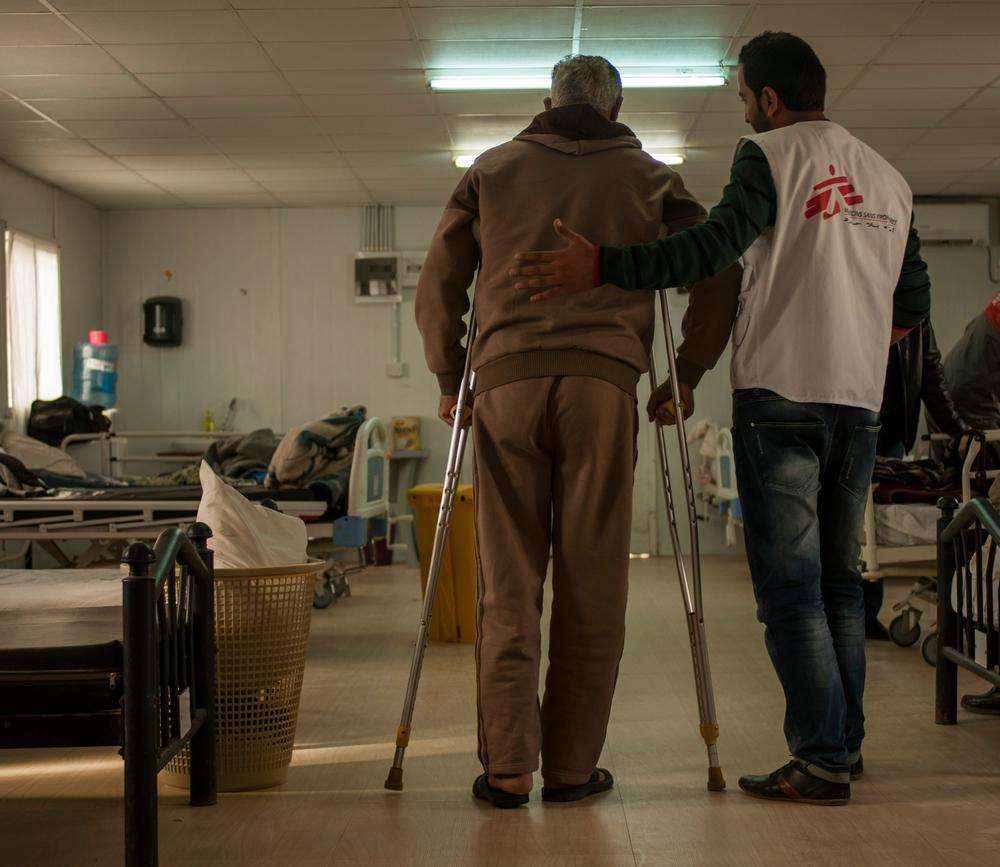AMMAN, JORDAN, DECEMBER 7, 2016—A clinic run by Doctors Without Borders/Médecins Sans Frontières (MSF) in Jordan's Zaatari refugee camp has been forced to close due to Jordan's closure of its Syrian border, preventing war-wounded Syrians from receiving treatment, MSF said today.
The clinic provided post-operative care to refugees who underwent surgery in Ramtha, where MSF has run a surgery program alongside the Ministry of Health for more than three years. However, since Jordan sealed its Syrian border on June 21, medical evacuations of war-wounded patients from southern Syria’s Dara’a governorate have halted, and the wards of MSF's surgical program are almost empty.
“With fighting and airstrikes intensifying in southern Syria since late September, MSF has received information that the number of Syrians injured in this brutal conflict has mounted,” said Luis Eguiluz, MSF’s head of mission in Jordan. “However, MSF’s ability to save lives has been seriously restricted now that war-wounded patients are not allowed in, and while we wait for the borders to open, the seriously wounded do not have the option to wait.”
MSF’s surgical team in Ramtha Hospital continues to treat the limited specific cases of war-wounded patients allowed into the country. But should the border remain shut, the surgery program may also be forced to close.
The lack of adequate medical care is jeopardizing wounded Syrians' lives. Field hospitals that remain in southern Syria are overstretched and short of staff and equipment. Patients may be transferred from one field hospital to the next in pursuit of qualified staff or equipment to perform complex surgeries that could otherwise be performed in Jordan.
Through its medical partners in southern Syria, MSF has recorded at least 70 cases of war-wounded Syrians—16 of them children—being denied permission to cross the Jordanian border, despite being in need of lifesaving surgical treatment.
“Knowing that there are probably patients dying just a few kilometers away on the other side of the border because of lack of access to essential medical care is shameful,” said Marjan Besuijen, MSF project coordinator in Zaatari. “This is solely due to a physical barrier depriving those desperately in need of lifesaving medical care from receiving it.”
MSF opened its 40-bed post-operative care clinic in Zaatari refugee camp in late March 2014 to provide convalescent and rehabilitative care to Syrian patients, including prosthetics, physiotherapy and psychosocial support. A total of 531 war-wounded patients referred from Ramtha Hospital and other medical facilities were admitted to the clinic, while the staff carried out 2,143 outpatient consultations, 1,454 physiotherapy sessions, and more than 2,500 mental health consultations.
MSF reiterates its calls on the government of Jordan to reverse its decision and open its borders to war-wounded Syrians to enable them to access urgent lifesaving medical care unavailable to them in Syria.
MSF has been working in Jordan since August 2006 when it set up a reconstructive surgery project in the capital, Amman. Since 2013, MSF has been running an emergency trauma surgical project in Ramtha hospital, as well as a mother and child hospital and two non-communicable disease projects in Irbid and Ramtha, to support both Syrian refugees and vulnerable Jordanians.





